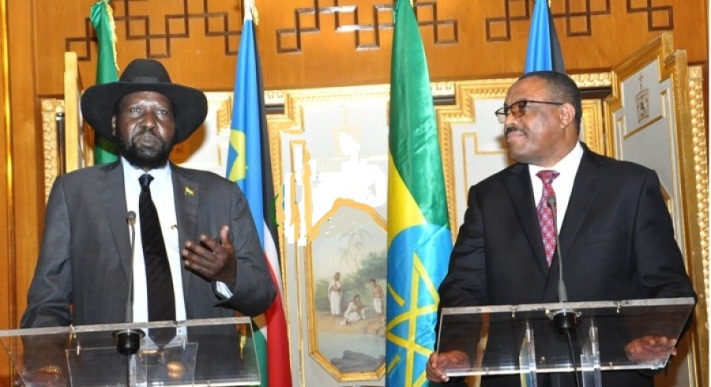Ethiopia and South Sudan agree to construct oil route

February 24, 2017 (ADDIS ABABA/JUBA) – President Salva Kiir and Prime Minister Hailemariam Desalegn have agreed to build a road linking the two countries enabling South Sudan to export its oil to the landlocked Ethiopia.
President Kiir arrived in Ethiopia Thursday afternoon on a three-day official visit.
Kiir and Desalegn on Friday signed eight cooperation agreements to enhance economic cooperation and border security between the two neighbouring countries.
Speaking at the signing ceremony in Addis Ababa, the Ethiopian prime minister welcomed the agreement saying “We don’t need to go too far distance to import oil while South Sudan is close by here with us,” the Ethiopian premier said.
Hailemariam further said Ethiopia is currently constructing a highway from Dima to Raad and intends to extend this road further to Boma as part of its plans to boost economic ties with the world’s youngest nation.
The highways due to be constructed will stretch from Gambella-Pagak-Palouge while the second one from Dima-Raad-Boma-Bor.
The minister at the South Sudanese presidency, Mayiik Ayii, Gai, said the construction of the road comes together with the building of a refinery in Upper Nile with the capacity to process up top 100,000 barrels of oil per day. This project is funded by Swiss and U.S companies.
“If the construction of this refinery is completed and the road is completed, we will have access to some hard currency through these refined products”, he told Sudan Tribune.
He went further to say that the refinery will allow South Sudan to export refined fuel products at very decent prices to countries in the region, including Ethiopia.
South Sudan currently exports its oil crude to the international market through Port Sudan, and imports fuel from countries in the region.
The leaders said the trans-border highway projects will allow free movement of people, enhance trade exchange and social ties between peoples of the two sisterly countries.
The two countries have also signed agreements on power, trade, health, infrastructure, information, communication and media.
Another deal was also reached to establish a joint border committee which follows up implementation of joint development activities along with their shared border.
A joint border administrators/governors committee will be formed in the earliest time possible to strengthen cooperation on issues of security, trade and infrastructure development.
With regard to the political turmoil and finding durable solution to the conflict in South Sudan the two sides recognized “the need to work together for the implementation of the agreement on the resolution of the conflict in South Sudan” signed in Addis Ababa in August 2015.
The two leaders further agreed to jointly work together for an inclusive process of the national dialogue in South Sudan.
President kiir declared national dialogue on December 2016 in a bid to arrest nearly three-years long conflict.
He called on armed opposition groups to lay down arms and join the national dialogue.
Earlier this week, Kiir renewed his call on opposition groups to join the “open forum” arguing the national dialogue is the best option to consolidate peace in South Sudan.
(ST)

